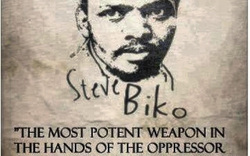
In this piece, fellow Rachel Sinha, reflects on inherited systems and the potential to change their course through time and space. The original piece is available at:
http://rachelsinha.com/?p=1029
“At visiting time, we asked our wives to leave, before the prison guards told them they had to” he said.
A small cluster of us sat wide eyed and silent as Malusi Mpumlwana, co-founder of the Black Consciousness movement in South Africa and Horst Kleinschmidt, a prominent white anti-Apartheid activist shared story after story of how they found a sense of ‘life’ even in the most oppressive of circumstances.
This was one of ‘Agency’. The concept that in that moment they had control over their own circumstances, no matter how small that decision was. And Agency was just one of the ‘Leading Causes of Life’ offered to us as a framework for reflection and discussion at the gathering at Mont Fleur in the Stellenbosch & Helderberg Mountains near Cape Town, this January.
http://rachelsinha.com/?p=1029
“At visiting time, we asked our wives to leave, before the prison guards told them they had to” he said.
A small cluster of us sat wide eyed and silent as Malusi Mpumlwana, co-founder of the Black Consciousness movement in South Africa and Horst Kleinschmidt, a prominent white anti-Apartheid activist shared story after story of how they found a sense of ‘life’ even in the most oppressive of circumstances.
This was one of ‘Agency’. The concept that in that moment they had control over their own circumstances, no matter how small that decision was. And Agency was just one of the ‘Leading Causes of Life’ offered to us as a framework for reflection and discussion at the gathering at Mont Fleur in the Stellenbosch & Helderberg Mountains near Cape Town, this January.
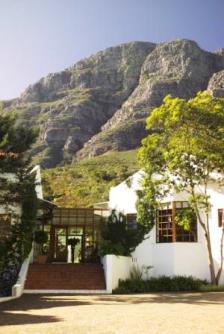 Mont Fleur, where we stayed for three days
Mont Fleur, where we stayed for three days There are five causes in total. The culmination of years of action research and thinking.
The roots of the initiative are in public health.
A reaction to the repetitive discussion in that sector about ‘leading causes of death’. Gary Gunderson found himself asking unexpectedly at a conference ‘what if we looked for leading causes of life instead?’
Not life as the opposite to death, or life as in happiness, but he and the core team set out to explore how can we might create conditions for life in all its beauty to thrive.
What are the five leading causes of life?
The five causes are simple;
In essence they are what makes a community feel like it means something to its participants and I have already begun to build them into the design of our workshops and accelerator programmes.
But for me they have also promoted deeper insight of a much more personal nature, which I want to write down to understand. I will discuss three.
What do the causes of life mean to me?
Intergenerativity
The roots of the initiative are in public health.
A reaction to the repetitive discussion in that sector about ‘leading causes of death’. Gary Gunderson found himself asking unexpectedly at a conference ‘what if we looked for leading causes of life instead?’
Not life as the opposite to death, or life as in happiness, but he and the core team set out to explore how can we might create conditions for life in all its beauty to thrive.
What are the five leading causes of life?
The five causes are simple;
- Intergenerativity – Passing wisdom up and down through the generations
- Agency - Ability to control my own decisions
- Coherence – Making sense of what has happened to me
- Hope - Belief that a better future is possible
- Connection – Meaningful connection to the people around me
In essence they are what makes a community feel like it means something to its participants and I have already begun to build them into the design of our workshops and accelerator programmes.
But for me they have also promoted deeper insight of a much more personal nature, which I want to write down to understand. I will discuss three.
What do the causes of life mean to me?
Intergenerativity
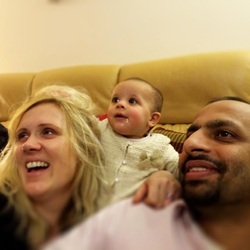 Us
Us Gary said at the gathering that ‘intergenerativity’ (passing down through the generations) was one thing that made this list somewhat unique, Certainly it has been the cause that’s struck me the most.
On my journey up to Mont Fleur I stopped in Somerset West to spend the day with my Great Auntie Eileen who lived in a nursing home there.
We arrived, settled down on the sofa just as a nurse walked past. We all looked up. ‘Funny colour isn’t she?’ she quipped. I looked down at my half Indian daughter and to my husband Pratik and winced.
It was hard to hear the stories at Mont Fleur after that. I felt a sense of responsibility I wasn’t planning for.
It had been people like my Great Auntie, who had been part of the status quo.
Stories of ‘sundowners’ and adventure in Africa were passed down our family line.
But what wasn’t told was what this norm had done to those who lived under it. The economic restrictions, the beatings, the displacement, the break-up of families. A life-squashing system upheld in the name of white supremacy or just inability to try to see things differently.
I would like to believe that my ancestors weren’t the worst perpetrators. My Uncle Charlie was head of African workers for a mining company. Auntie Eileen proudly told me stories of how he’d fired racist white workers and spoke four African languages.
But history shines an unflattering light on those who said nothing and accepted it as normal. It was a reminder to me that what is passed down from elders is not always wisdom. And it is not always right.
It made me question what am I complicit in? How do I prevent myself from being a passive victim of the time I am born in? What will history say about me and my generation?
I suspect our focus on consumerism, the way we treat animals and our lack of action on climate change will be up there. I really like this animation, which covers off quite a few of those.
I’m also reminded that it is not because I’ve worked hard that I have a pretty good life. I’ve done well because I was born with an invisible backpack of privilege (a phrase I learnt from the Labs work with economic justice campaigners). This has been passed down from my ancestors for uncountable generations. And this gives me such a head start, it’s ridiculously unfair.
Malusi talked about ‘Black Consciousness waking people up so they could reject the prevailing opinion that the white way of doing things was a universal ‘truth’. My good friend Cassie Robinson talks about ‘systems consciousness’ and for me intergenerativity is about this. Shining a light on the systems that we have inherited, that are invisible if you choose not to ask questions about them, but are there nonetheless.
Malusi talked about ‘Black Consciousness waking people up so they could reject the prevailing opinion that the white way of doing things was a universal ‘truth’. My good friend Cassie Robinson talks about ‘systems consciousness’ and for me intergenerativity is about this. Shining a light on the systems that we have inherited, that are invisible if you choose not to ask questions about them, but are there nonetheless.
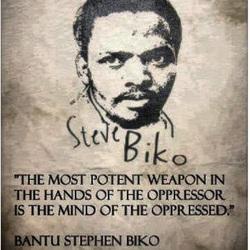
If we want to be on the right side of history, it is our responsibility to decide whether we support these systems or change them, whether you are the opressor or the oppressed.
Agency
On a particularly boring holiday a few years ago, I did a fascinating exercise. I drew my family tree, mapping each member and ancestors as far back as I could remember, noting down five personality traits for each person.
The process was designed to offer an insight into your family culture. What kind of characters were acceptable? What stories were celebrated, ridiculed or looked down upon?
I discovered quite quickly that I come from a long line of strong women who lived life as they wanted it.
Women like my Great, Great Grandmother Alice, who married a cartoonist for Punch and gambled the family fortune on the horses. Or my Granny Bird who was witty and talkative and bossy and had no interest in cooking whatsoever, so served spaghetti hoops for dinner almost every night. And of course my Auntie Eileen, a physio, who moved away after a failed relationship, without a care of what her family thought, on an adventure to Africa. I have many of my ancestors’ clothes and I have always worn them. Mad Men cocktail dresses with flared skirts and high necks, matching jackets and fascinators. They are full of style and fun.
Agency
On a particularly boring holiday a few years ago, I did a fascinating exercise. I drew my family tree, mapping each member and ancestors as far back as I could remember, noting down five personality traits for each person.
The process was designed to offer an insight into your family culture. What kind of characters were acceptable? What stories were celebrated, ridiculed or looked down upon?
I discovered quite quickly that I come from a long line of strong women who lived life as they wanted it.
Women like my Great, Great Grandmother Alice, who married a cartoonist for Punch and gambled the family fortune on the horses. Or my Granny Bird who was witty and talkative and bossy and had no interest in cooking whatsoever, so served spaghetti hoops for dinner almost every night. And of course my Auntie Eileen, a physio, who moved away after a failed relationship, without a care of what her family thought, on an adventure to Africa. I have many of my ancestors’ clothes and I have always worn them. Mad Men cocktail dresses with flared skirts and high necks, matching jackets and fascinators. They are full of style and fun.
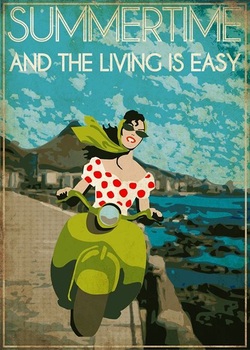
Great Auntie Eileen died in the nursing home two months after I left Mont Fleur. At her funeral they read out a message I’d sent a year before, for her 95th Birthday;
“It means so much to me to have a woman in our family who has just grabbed life by the horns and went and made it what she wanted it to be. Although we don’t see you often, I want you to know what a big impact you have on us all as a symbol of living your dreams.”
The idea of Agency is strong for everyone in my family. That you can move to Australia or Bangladesh, go travelling alone, go sailing and camping and do the job that you find most interesting, because life is an adventure.
Marrying into an Indian family, has given me an insight to the other side of this coin. The idea that your life is predestined. that there is a limited range of jobs you should do and that the person you will marry will be decided for you. This is the age-old difference between cultural individualism vs collectivism. And what my English culture brings in Agency it lacks in human Connection. The warmth and love I feel in my Indian extended family is incomparable to the English way of doing family. I’m not sure if it is possible for culture to have both.
But what’s interesting is that the systems that are handed down to us from our ancestors are not just tangible like our health system, with its hospitals and doctors and rules and regulations.
A cultural system is also passed down. Because culture becomes such an integral part of who we are, how we behave in every situation, it can be very difficult to untangle what you really think, from what has been reinforced in your life to date. I know this because marrying someone from a different culture has held a huge mirror up to my own assumptions. We have different starting points on most things from how often you see your relatives to how many cups of tea you have in a day.
Although culture is intangible, it has a huge bearing on whether you are able to easily meet these Leading Causes of Life. Ask any gay child who’s born into a homophobic family, how much connection and agency they feel.
It seems to me that in order to really rethink our systems, we need to be prepared to face our cultural starting point and decipher what we’ve inherited and what we’re willing to let go of, for the greater good.
Hope
Watching the London Olympic Games opening ceremony with the rising pillars of the industrial revolution, made me realise how many of the systems we are now trying to change, have roots in the UK.
“It means so much to me to have a woman in our family who has just grabbed life by the horns and went and made it what she wanted it to be. Although we don’t see you often, I want you to know what a big impact you have on us all as a symbol of living your dreams.”
The idea of Agency is strong for everyone in my family. That you can move to Australia or Bangladesh, go travelling alone, go sailing and camping and do the job that you find most interesting, because life is an adventure.
Marrying into an Indian family, has given me an insight to the other side of this coin. The idea that your life is predestined. that there is a limited range of jobs you should do and that the person you will marry will be decided for you. This is the age-old difference between cultural individualism vs collectivism. And what my English culture brings in Agency it lacks in human Connection. The warmth and love I feel in my Indian extended family is incomparable to the English way of doing family. I’m not sure if it is possible for culture to have both.
But what’s interesting is that the systems that are handed down to us from our ancestors are not just tangible like our health system, with its hospitals and doctors and rules and regulations.
A cultural system is also passed down. Because culture becomes such an integral part of who we are, how we behave in every situation, it can be very difficult to untangle what you really think, from what has been reinforced in your life to date. I know this because marrying someone from a different culture has held a huge mirror up to my own assumptions. We have different starting points on most things from how often you see your relatives to how many cups of tea you have in a day.
Although culture is intangible, it has a huge bearing on whether you are able to easily meet these Leading Causes of Life. Ask any gay child who’s born into a homophobic family, how much connection and agency they feel.
It seems to me that in order to really rethink our systems, we need to be prepared to face our cultural starting point and decipher what we’ve inherited and what we’re willing to let go of, for the greater good.
Hope
Watching the London Olympic Games opening ceremony with the rising pillars of the industrial revolution, made me realise how many of the systems we are now trying to change, have roots in the UK.

For me, remembering history is the key to hope for the future. Realising that the systems we operate within had a starting point. Oppressive regimes, family culture, food, finance and health systems. The way they work are not laws of nature, but they are passed down, inherited perhaps by so many ancestors we have forgotten where they began.
These things are made up and therefore we always have the power to change them.
Everything passes in time
On a night out in my early twenties, my friend Kat and I met a guy who had just finished doing time in Holloway prison.
These things are made up and therefore we always have the power to change them.
Everything passes in time
On a night out in my early twenties, my friend Kat and I met a guy who had just finished doing time in Holloway prison.

I asked him about a million questions including how he survived, to which he replied ‘everything passes in time’. His words have stayed with me since.
He’s right. Everything does pass in time. Things move on. Challenges become stories and, if we’re clever about it, become words of wisdom that can help others.
Systems are ever-changing. Regimes are overthrown, new ones are formed, new markets are built, new cultures emerge based on different values. The next generation comes with new energy to build things differently.
And of course we as individuals are not immune to this law. We will also pass in time.
I am after all, just another equal branch on our family tree. And there were relatives on my tree who we can’t remember anything about. A whole life and nothing to be remembered by.
It makes me think about what contribution I can make that will allow life to flourish, not distinguish it.
I have been hugely inspired by meeting Horst, Malusi and others in South Africa. Learning from the example they’ve set of self-sacrifice for things that are bigger than all of us. I am grateful too, for my Great Auntie Eileen, for the lessons she has taught me also.
There is no happy ending to this hugely complex mess of thoughts, but in a twist of pure serendipity, two months after I left South Africa, Auntie Eileen’s ashes were scattered in the same spot as my Great Uncle Charlie’s before her. In the mountains above Somerset West, near Mont Fleur.
He’s right. Everything does pass in time. Things move on. Challenges become stories and, if we’re clever about it, become words of wisdom that can help others.
Systems are ever-changing. Regimes are overthrown, new ones are formed, new markets are built, new cultures emerge based on different values. The next generation comes with new energy to build things differently.
And of course we as individuals are not immune to this law. We will also pass in time.
I am after all, just another equal branch on our family tree. And there were relatives on my tree who we can’t remember anything about. A whole life and nothing to be remembered by.
It makes me think about what contribution I can make that will allow life to flourish, not distinguish it.
I have been hugely inspired by meeting Horst, Malusi and others in South Africa. Learning from the example they’ve set of self-sacrifice for things that are bigger than all of us. I am grateful too, for my Great Auntie Eileen, for the lessons she has taught me also.
There is no happy ending to this hugely complex mess of thoughts, but in a twist of pure serendipity, two months after I left South Africa, Auntie Eileen’s ashes were scattered in the same spot as my Great Uncle Charlie’s before her. In the mountains above Somerset West, near Mont Fleur.

 RSS Feed
RSS Feed
